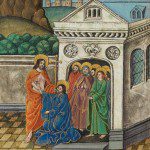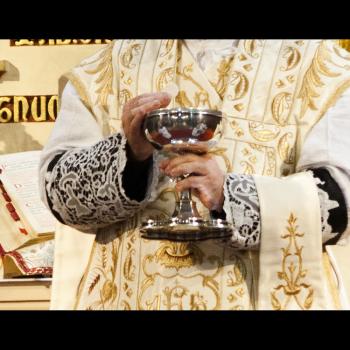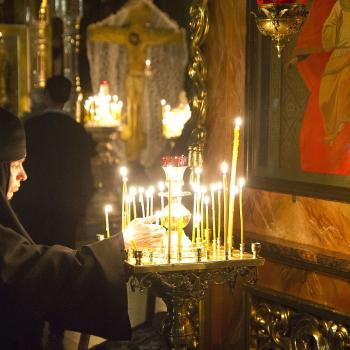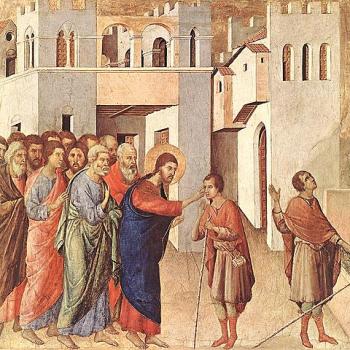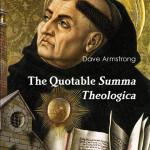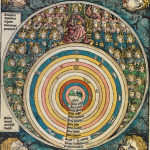![By unknown, made to represent the Vergilius Vaticanus (Internet Archive) [Public domain], via Wikimedia Commons](https://wp-media.patheos.com/blogs/sites/637/2017/04/Cheval_de_Troie_dapr%C3%A8s_le_Virgile_du_Vatican-252x300.jpg)
Then Laocoön rushes down eagerly from the heights
of the citadel, to confront them all, a large crowd with him,
and shouts from far off: ‘O unhappy citizens, what madness?
Do you think the enemy’s sailed away? Or do you think
any Greek gift’s free of treachery? Is that Ulysses’s reputation?
Either there are Greeks in hiding, concealed by the wood,
or it’s been built as a machine to use against our walls,
or spy on our homes, or fall on the city from above,
or it hides some other trick: Trojans, don’t trust this horse.
Whatever it is, I’m afraid of Greeks even those bearing gifts.’[5]
Laocoön would be killed by, his warning left unheeded, and the people of Troy would take in the Trojan Horse and set in motion the destruction of the city itself. Because the kingdom of hell is divided against itself, because sin fights against sin for determining what will rule in our soul, so the suspicions of the priests of the kingdom of hell are often left unheeded. The temptation of Christ shows how Christ was held in suspicion by the powers of darkness, and yet he had come in and through the line of David, a line filled with sinners, so the suspicions were put on hold as the devil believed Jesus would be found weak and fall into sin once his heart was tested. His humanity hid the divinity from the devil, though the devil suspected – barely suspected – what could be found beyond the humanity he could see, which is why he set out to destroy Jesus in one way, through sin, or another, through the death and crucifixion of Christ. When Jesus, the supreme bait, was taken into the city of Jerusalem and crucified, the powers of darkness thought that they had won the battle against God. That which appeared to be the victory of evil was revealed to be its downfall, as Jesus allowed evil to do all it wanted to do to him, until its power and potency was burned out. Then Jesus revealed himself to be the author of life, transcending even the death which sin uses to rule over humanity. This victory was the eschatological act of God in human history, the final act of a long play which God had staged in world history. In that play, God was at work with humanity, often behind the scenes, as he set up and established the holy line which would lead up to Christ, a line which until the birth of Mary and her son, Jesus the Christ, appeared to be like any other line, with men and women struggling with sin.
But to those who were open to God, who were letting him guide them, they could see the holiness in these supposed sinners, and see the Spirit of God working wonders through them. Though the world knew her as a sinner, as a prostitute, God’s Spirit had come upon her, turning her into a prophet of God as she told the people of Israel what they must do to receive the glory God desired for them: “Go into the hills, lest the pursuers meet you; and hide yourselves there three days, until the pursuers have returned; then afterward you may go your way” (Josh. 2:16b RSV). While these words could seem to be ordinary words of warning, as Origen explained, hidden in them was a great spiritual truth, showing how Rahab was able to smuggle in grace through the appearance of a life of sin:
But let us consider the transactions the wise prostitute had with the spies. Having no land, she gives them mystic and heavenly counsel. “Go through the mountains,” she says. Do not proceed through the valleys, shun low and dispirited things, proclaim those things that are lofty and sublime. She herself puts the scarlet-colored sign in her house, through which she is bound to be saved from the destruction of the city. No other sign would have been accepted, except the scarlet-colored one that carried the sign of blood. [6]
Let us look to Rahab and honor her as we take her into ourselves. She is a true prophet of God, representing the goodness which sin cannot destroy. When we sin, we will some good with our action, and whatever that good is, Rahab is there speaking to us, proclaiming the glory of God and the fullness of the good to us. We must heed her. She has authority from God which we must not deny. We must follow her direction and move outside the city of sin. Then we can slowly climb up the mountain of God. For we find reflected in all our sin, in all the things which we love, a goodness which points beyond itself to the goodness of God. Sin encourages us to follow the path of goodness to a lesser good, because sin works on the will to the good by distracting that will from the higher good to a lower good. Yet because it works with the good, it has its own undermining within, and those who look and examine that good will find Rahab there pointing beyond herself to the mystical mountain of God, to the height of the good from which we shall be able to see and watch the true victory of God.
[1] St. John Chrysostom, Homilies on Matthew in NPNF1(10): 17.
[2] Origen, Homilies on Joshua. trans. Barbara J. Bruce. ed. Cynthia White (Washington, DC: Catholic University of America Press, 2002), 31-2.
[3] St. Ambrose, “Exposition of the Christian Faith” in NPNF2(10): 300.
[4] St. Anthony of Padua, Sermons For Sundays and Festivals. Volume I. trans Paul Spilsbury (Padova: Edizioni MEssaggero Padova, 2007), 296.
[5] Vergil, Aeneid. trans. A. S. Kline (Book II). http://www.poetryintranslation.com/PITBR/Latin/VirgilAeneidII.htm
[6] Origen, Homilies on Joshua, 49.
Stay in touch! Like A Little Bit of Nothing on Facebook:
A Little Bit of Nothing


